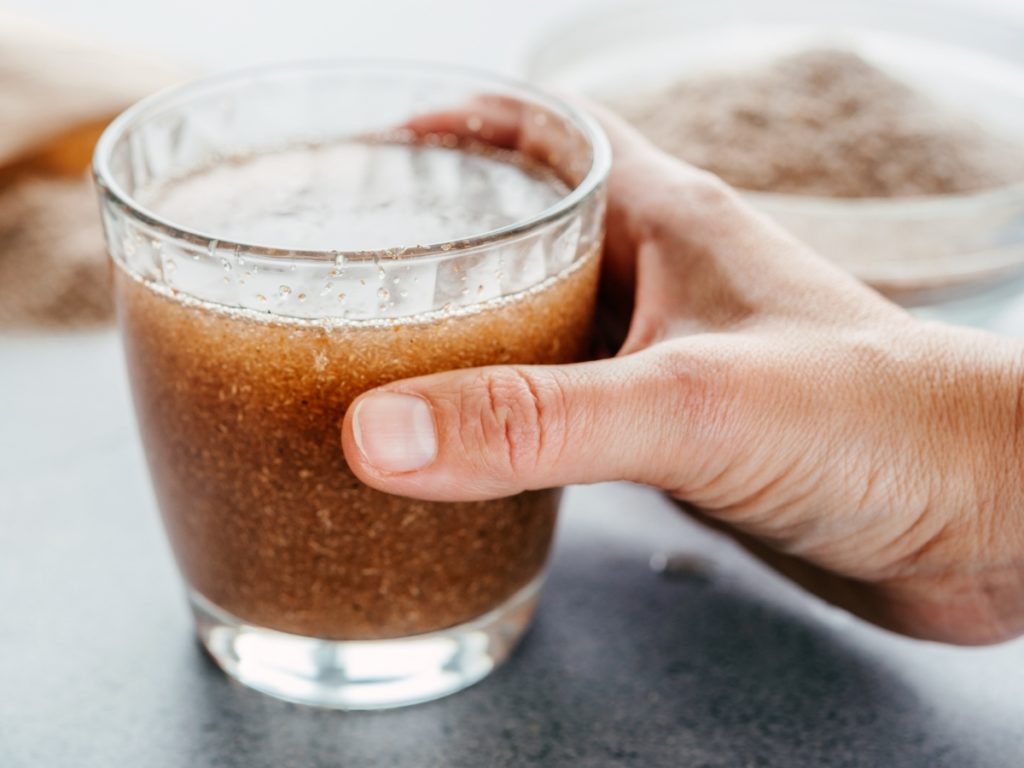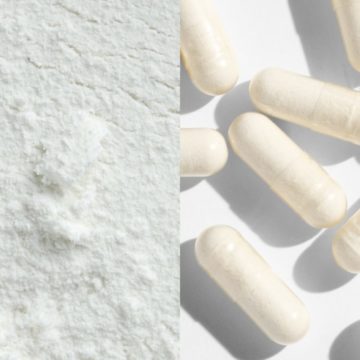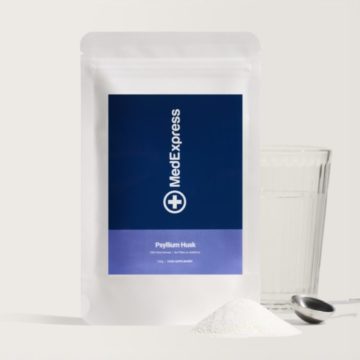With GLP-1 weight loss treatments rising in popularity, some are claiming that natural supplements like psyllium husk have similar benefits. But what are psyllium supplements? Can they help you lose weight, and what other benefits do they have? Here’s what our experts say.
What is psyllium husk?
Psyllium husk (also known as ispaghula husk) is a fibre supplement derived from Plantago ovata, a common medicinal plant mainly grown in India. [1] It’s a soluble fibre, which means it passes through your small intestine without being absorbed or broken down. Instead, it absorbs water and forms psyllium gel, a thick, viscous substance which moves through your digestive tract and acts as a bulk-forming laxative. This type of laxative increases the volume or bulk of stools, which helps stimulate your bowel and move stools through your digestive system more easily. [2]
Many people use psyllium as a dietary supplement. One common form is psyllium husk powder, which is ground from the outer layer of psyllium seeds. [3]
Does psyllium husk help with weight loss?
Psyllium husk is gaining popularity online as an alternative to injectable GLP-1 medications like Mounjaro and Wegovy, which cause significant weight loss. [4, 5] Some people claim you can achieve GLP-1 benefits — increased feelings of fullness, appetite suppression and blood sugar control — with psyllium husk, without a prescription. However, this isn’t the case.
Fibre supplements like psyllium husk can increase feelings of fullness and reduce hunger, like GLP-1s, [6] but the active ingredients in Mounjaro and Wegovy do this by targeting hunger receptors and slowing digestion. [7] Soluble fibres, like psyllium husk, achieve satiety simply by sitting in your stomach for longer. [8] While GLP-1s help regulate your blood sugar levels by mimicking a natural hormone in your gut, psyllium husk does this by trapping sugars in your digestive tract before they can be absorbed into your bloodstream. [9]
Although psyllium husk isn’t a replacement for GLP-1 medications, taking fibre supplements and increasing your dietary fibre intake can help ease side effects and support the benefits of your GLP-1 treatment.
Benefits of psyllium husk
Psyllium husk has many health benefits, and is often recommended to help relieve symptoms of irritable bowel syndrome, chronic constipation, diarrhoea and other intestinal concerns. Here are some of its most common uses.
Constipation relief
Psyllium is a bulk-forming laxative, which means it binds partially digested food and water to increase the size and moisture level of stools. This produces stools that are easier to pass and helps encourage regular bowel movements. [10] If you experience symptoms of constipation as a result of your GLP-1 medication, psyllium husk can help you manage them.
Diarrhoea treatment
Psyllium supplements can also help you manage diarrhoea by absorbing excess water in the digestive tract, adding bulk to loose stools and slowing their movement through your digestive system. [9] Diarrhoea is a commonly reported side effect of GLP-1 medication, and taking psyllium alongside your treatment could help minimise this.
Increasing satiety
As previously mentioned, psyllium husk can increase feelings of fullness, with one study finding that taking it before breakfast and lunch can reduce hunger and improve satiety between meals. [6]
Regulating blood sugar
Clinical evidence shows that soluble fibres can slow the absorption of sugars into your bloodstream, which helps control your blood glucose levels. [9, 11]
Lowering cholesterol
Soluble fibres can bind to cholesterol in your digestive system, which helps it pass through your body instead of being absorbed into your bloodstream. This results in lowered LDL cholesterol levels — the type of cholesterol that can build up on artery walls and increase your risk of heart disease and stroke. [10]
Supporting heart health
Fibre has many benefits for your heart health. Eating dietary fibre can decrease your risk of heart disease, stroke and atherosclerosis (a build up in your arteries). [12, 13] A recent review also found that psyllium could help reduce your blood pressure. [14]
Potential side effects
Like all medications and supplements, psyllium can cause some side effects. Many people experience no side effects, or only have minor symptoms that resolve on their own. These include stomach pain, stomach cramps and bloating. [15] If these symptoms are severe or persistent, contact your healthcare provider for advice.
Seek medical attention immediately if you have trouble swallowing or notice signs of an allergic reaction, including: rash, itching, difficulty breathing or swallowing, blistered skin or swelling of the mouth, face, tongue or throat.
How to take psyllium husk
Current UK guidelines advise you consume 30g of dietary fibre per day. [16] The amount of psyllium husk needed to reach your daily fibre goals will depend on your current fibre intake. Depending on the type of psyllium husk you purchase, you may need multiple doses per day to reach your daily fibre target. However, it’s important to note that psyllium husk should not be used as your only source of fibre — we recommend you follow a balanced diet with a variety of fibre sources.
You should take psyllium husk with at least one full glass of water, and make sure you drink plenty of water throughout the day after taking it to prevent constipation.
Psyllium husk can also be mixed into food products like yoghurt, porridge, smoothies and baked goods.
Get support with weight loss
Interested in medicated weight loss? Our clinical team can help you find the right treatment to reach your goals.
Find out what treatment is suitable for you on MedExpress.
References
- Semeco A. Psyllium: Benefits, safety, and dosage [Internet]. www.medicalnewstoday.com. 2020. Available from: https://www.medicalnewstoday.com/articles/318707
- Liu LWC. Chronic constipation: current treatment options. Canadian journal of gastroenterology = Journal canadien de gastroenterologie [Internet]. 2011 Oct;25 Suppl B(Suppl B):22B28B. Available from: https://pubmed.ncbi.nlm.nih.gov/22114754/
- Zitterman A. DIETARY FIBER | Bran. In: Caballero B, editor. Encyclopedia of Food Sciences and Nutrition (Second Edition) [Internet]. Academic Press; 2003 [cited 2024 Dec 5]. p. 1844–50. Available from: https://doi.org/10.1016/B0-12-227055-X/00346-1.%20 (https://www.sciencedirect.com/science/article/pii/B012227055X003461)
- Jastreboff AM, Aronne LJ, Ahmad NN, Wharton S, Connery L, Alves B, et al. Tirzepatide Once Weekly for the Treatment of Obesity. New England Journal of Medicine [Internet]. 2022 Jun 4;387(3). Available from: https://www.nejm.org/doi/full/10.1056/NEJMoa2206038
- Wilding JPH, Batterham RL, Calanna S. Once-Weekly Semaglutide in Adults with Overweight or Obesity. The New England Journal of Medicine. 2021 Feb 10;384(11):989–1002.
- Brum JM, Gibb RD, Peters JC, Mattes RD. Satiety effects of psyllium in healthy volunteers. Appetite [Internet]. 2016 Oct [cited 2019 Oct 31];105:27–36. Available from: https://www.sciencedirect.com/science/article/pii/S0195666316301738
- Collins L, Costello RA. Glucagon-like peptide-1 receptor agonists [Internet]. PubMed. Treasure Island (FL): StatPearls Publishing; 2024. Available from: https://www.ncbi.nlm.nih.gov/books/NBK551568/
- Hervik AK, Svihus B. The Role of Fiber in Energy Balance. Journal of nutrition and metabolism [Internet]. 2019;2019:4983657. Available from: https://www.ncbi.nlm.nih.gov/pmc/articles/PMC6360548/
- Abutair AS, Naser IA, Hamed AT. Soluble fibers from psyllium improve glycemic response and body weight among diabetes type 2 patients (randomized control trial). Nutrition Journal. 2016 Oct 12;15(1).
- Lambeau KV, McRorie JW. Fiber supplements and clinically proven health benefits. Journal of the American Association of Nurse Practitioners [Internet]. 2017 Apr [cited 2019 Dec 17];29(4):216–23. Available from: https://www.ncbi.nlm.nih.gov/pmc/articles/PMC5413815/pdf/JAAN-29-216.pdf
- Xiao Z, Chen H, Zhang Y, Deng H, Wang K, Bhagavathula AS, et al. The effect of psyllium consumption on weight, body mass index, lipid profile, and glucose metabolism in diabetic patients: A systematic review and dose‐response meta‐analysis of randomized controlled trials. Phytotherapy Research. 2020 Jan 9;34(6):1237–47.
- McRae MP. Dietary Fiber Is Beneficial for the Prevention of Cardiovascular Disease: An Umbrella Review of Meta-analyses. Journal of Chiropractic Medicine [Internet]. 2017 Dec;16(4):289–99. Available from: https://www.ncbi.nlm.nih.gov/pmc/articles/PMC5731843/
- Soliman GA. Dietary Fiber, Atherosclerosis, and Cardiovascular Disease. Nutrients [Internet]. 2019 May 23;11(5):1155. Available from: https://www.ncbi.nlm.nih.gov/pmc/articles/PMC6566984/
- Clark CCT, Salek M, Aghabagheri E, Jafarnejad S. The effect of psyllium supplementation on blood pressure: a systematic review and meta-analysis of randomized controlled trials. The Korean Journal of Internal Medicine. 2020 Nov 1;35(6):1385–99.
- Psyllium Side Effects: Common, Severe, Long Term [Internet]. Drugs.com. Available from: https://www.drugs.com/sfx/psyllium-side-effects.html
- NHS. How to get more fibre into your diet [Internet]. nhs.uk. 2022. Available from: https://www.nhs.uk/live-well/eat-well/digestive-health/how-to-get-more-fibre-into-your-diet/



